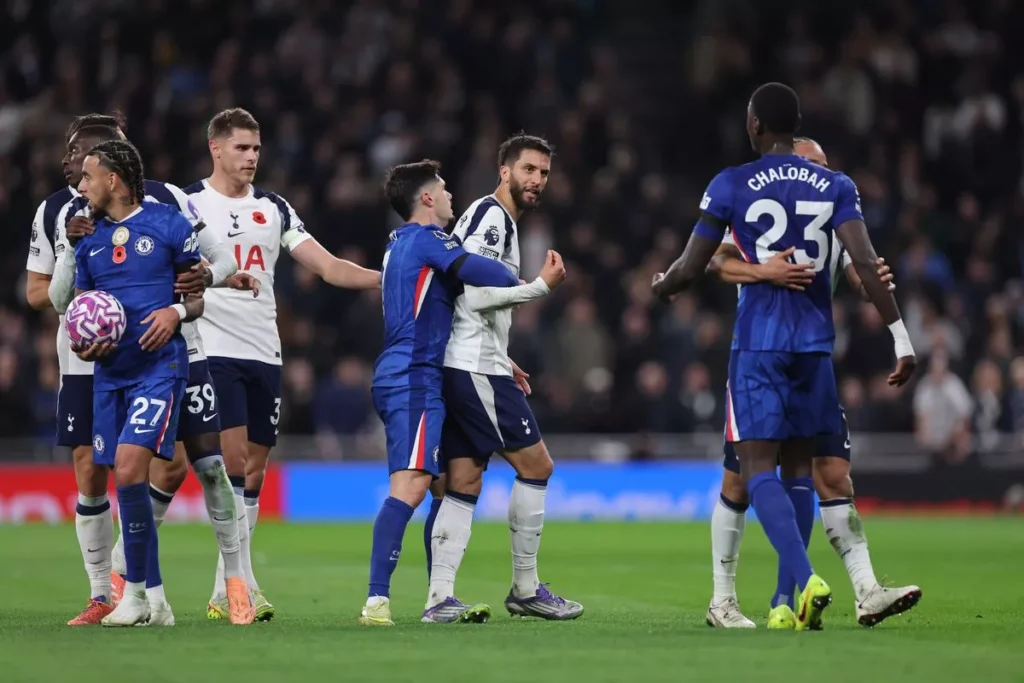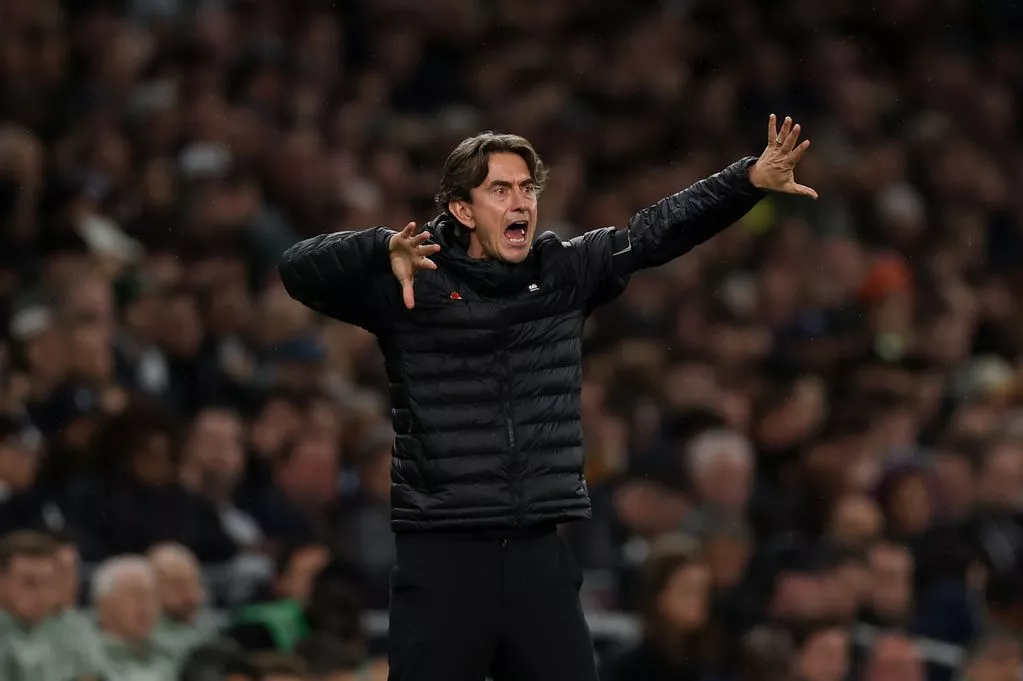Tottenham Hotspur’s defeat to Chelsea left a bitter taste at the Tottenham Hotspur Stadium, not just because of the 1-0 scoreline, but because of the manner of the performance.
Two years earlier, Spurs had lost to the same opponents under very different circumstances. Back then, despite being reduced to nine men, the team showed fight and passion, earning applause from their fans who respected their spirit even in defeat.
Fast forward to the present, and the mood could not be more different. Boos echoed around the ground as Thomas Frank’s side walked off after a lifeless performance that lacked courage, desire, and any real quality.
Frank tried to rally his players to show some appreciation to the supporters, urging Micky van de Ven and Djed Spence to join him in applauding the fans. Instead, both players ignored him.
Van de Ven gestured toward the tunnel, while Spence walked past Frank with visible frustration, muttering angrily. Their actions summed up the mood of a fractured evening.
The Danish manager stood there watching, his expression one of disappointment and disbelief. For a coach trying to build unity and respect, this was a troubling image that spoke louder than words.
It was especially hard to digest because both players had been directly involved in the mistake that led to Chelsea’s winning goal. Spence lost possession twice outside his own box through overconfidence on the ball.
Although Spurs momentarily regained possession, Van de Ven’s poor pass put Xavi Simons under pressure. Instead of clearing, Simons tried to dribble past Moises Caicedo, Chelsea’s standout player on the night, and inevitably lost the ball again.

Caicedo pounced, setting up Joao Pedro to score what proved to be the winner. Frank’s reaction was pure anger he lashed out, kicking a water bottle in frustration, fully aware that his team’s sloppiness had cost them dearly.
What made the players’ dismissal of their coach at full-time even worse was how much responsibility they bore for the result. Spurs supporters inside the stadium were furious, and rightly so.
They had witnessed another dreadful home performance, one that lacked effort and pride. Over the past year, Tottenham have turned their stadium from a feared venue into one of the easiest away grounds for opponents to visit.
Out of 20 home league matches in the last twelve months, Spurs have won only four and lost twelve a shocking record for a club of their size. What should be a fortress has instead become a crumbling sandcastle, washed away at the first sign of pressure.
When asked about the snub from Van de Ven and Spence, Frank tried to downplay the incident. He told reporters that emotions were running high and that frustration was natural after such a performance.
He praised both players for their overall contributions this season and insisted the situation was “a small issue.” His calm words did little to hide the reality the relationship between manager, players, and fans looks strained.
Inside the dressing room, Frank kept his message short. He delivered just 25 words to his players, reminding them to stay united even in difficult moments. “We met a better team today,” he told them.
“Make sure we stick together in bad times and good times. See you tomorrow.” It was a brief but telling message one that suggested disappointment more than anger.
However, the fans’ frustration is growing. Tottenham supporters had been urged to create a fierce atmosphere for the derby, but the team’s flat display drained the energy from the crowd.
The boos at halftime and full-time reflected not just anger, but exhaustion supporters tired of watching the same mistakes and lack of intent. The statistics from the match were damning.
Tottenham recorded their lowest-ever expected goals (xG) figure since such data began, with just 0.05. They managed only three shots all game, all from Mohammed Kudus, and just one on target.
Frank didn’t hide from how poor the performance was. He admitted it was one of the worst attacking displays of his managerial career and promised to look for solutions.
He accepted the boos from the stands, saying he fully understood the fans’ emotions and pain. Yet, beneath his calm demeanor, there was acknowledgment that Spurs had been “second best” in every department.

He pointed to a lack of energy, poor pressing, and tactical disorganization. His players, he admitted, simply didn’t meet the required level.
The problem for Frank is that Tottenham’s identity seems to have vanished. Under Ange Postecoglou and Mauricio Pochettino, the club had been defined by attacking intent and bravery.
Frank’s approach is more reactive, adjusting his setup to counter each opponent rather than imposing a consistent style. This tactical flexibility, while useful in theory, has left his team without rhythm or creativity.
Against Chelsea, Spurs started with four central midfielders, none of whom offered attacking spark. It was a cautious setup that backfired badly.
Frank insists his philosophy remains rooted in attacking football. He often repeats his mantra: “If you don’t take risks, you also take risks.” Yet his team did anything but that.
Only Kudus showed any willingness to take defenders on or attempt something bold, but he was double-marked throughout. The lack of creativity was glaring, especially with James Maddison and Dejan Kulusevski sidelined.
Frank admitted that Maddison might not play again this season, while Kulusevski’s return is still weeks away. That left Spurs overly reliant on young players like Xavi Simons and Wilson Odobert both technically gifted but physically lightweight and inexperienced in the Premier League.
Simons, brought on early after Lucas Bergvall suffered a head injury, once again struggled to cope with the league’s intensity. His careless touches and poor decisions frustrated Frank, though the manager defended him publicly, saying mistakes were part of the game. Still, these repeated errors have become costly, and patience is wearing thin.
Despite sitting fourth in the table, Tottenham’s position flatters them. Four of their five wins came against teams in the bottom six, and their overall performances have lacked conviction. Frank remains calm, insisting that improvement will come once his front line gels and key players return.
But history suggests Tottenham managers rarely get time to turn things around. At a club where expectations are sky-high, dull football and poor home form are a deadly combination.
Frank is an intelligent coach, known for adapting and rebuilding teams. At Brentford, he reinvented his side multiple times to stay competitive. Yet Tottenham is a different beast impatient, demanding, and unforgiving.
His ability to transform Spurs into a side that can create, excite, and win will determine whether he lasts beyond this season.
As he faced the press one final time that night, Frank remained composed. “We have 24 hours to feel frustrated,” he said. “Then we move forward. Every team I’ve coached has scored goals. It will happen again.”
His confidence sounded measured, perhaps even hopeful, but the clock is ticking. For Tottenham, improvement needs to come fast, because in north London, the future is never guaranteed especially for the man in the dugout.
